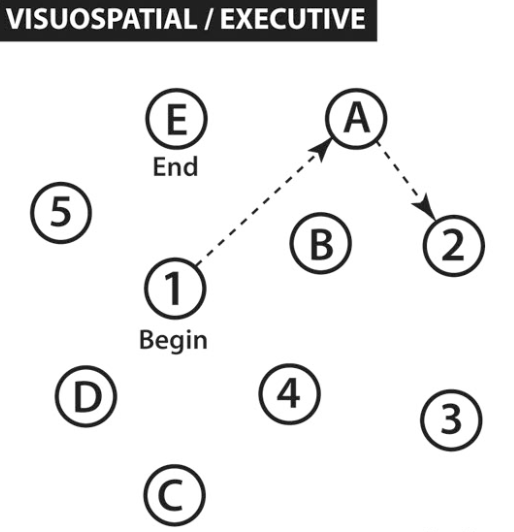The White House physician reported Tuesday that President Trump is in “excellent” overall health based on a four-hour examination. At Trump’s request, said Dr. Ronny Jackson, this included a common test of cognitive ability on which the President reportedly scored a perfect 30 out of 30.
Trump, who has famously bragged about his intelligence on Twitter, wasted no time in brandishing his score. In an interview with Reuters Wednesday, he blamed his three most recent predecessors for their failure regarding North Korea, and said, “I guess they all realized they were going to have to leave it to a president that scored the highest on tests.”
The 15-minute exam that Jackson administered is called the Montreal Cognitive Assessment, or MoCA, and is widely used to test for early signs of diseases like Alzheimer’s and other forms of dementia. None of the questions are difficult for someone who does not suffer from cognitive impairment, but “the test is very sensitive to early stages of these conditions,” says Dr. Ziad Nasreddine, who developed the assessment in 1996. “It’s unlikely that [Trump] has dementia or Alzheimer’s.”
Unlikely, but not impossible, says Dr. Paul J. Moberg, the clinical director of neuropsychology service at the University of Pennsylvania’s medical school.
“Just because a person gets a 30 out of 30 doesn’t mean you wouldn’t pick up even very significant impairments in further testing,” he said. “A more comprehensive neurological exam would be required to really tease that out.”
In some cases, he said, families might bring in a patient because he or she is demonstrating clear signs of dementia, such as memory loss or confusion, and the patient will ace the MoCA — only to be confirmed as having a serious deficit when given a comprehensive test that can take anywhere from three hours to a day.
“The MoCA is a wonderful cognitive screening test. But that’s what it is: a screening test,” says Moberg’s colleague David R. Roalf, a research assistant professor at the University of Pennsylvania Department of Psychiatry. “It doesn’t necessarily speak to competency, per se.” Moberg agreed: “A screening measure is not enough to assess competency.”
Why Trump requested the test is unclear, though he is undoubtedly aware that many of his critics have questioned whether he is mentally competent to be commander-in-chief. The most rigorous armchair psychiatry came from a publication that collected many hours of footage of interviews Trump has given since the 1980s and then consulted a battery of experts, some of whom suggested changes in his speech patterns strongly suggest cognitive decline. Other long-range diagnoses include narcissistic personality disorder, though at least one expert has both concurred with that assessment and suggested it does not impair Trump’s competency.
The MoCA assigns 11 tasks that test different cognitive skills. The first question, for example, poses to the examinee: “Please draw a line, going from a number to a letter in ascending order,” using the following image:

A few questions later, the test-taker is asked to name three animals:

(“Dromedary,” which is specifically a one-hump camel, is an acceptable answer to the third picture.)
Jackson himself clarified in his briefing with reporters on the President’s health that the exam is only “a screening assessment for cognitive impairment,” not a detailed survey of any sort. In other words, Trump cannot wave his cognitive report card and silence all skeptics, but neither should those skeptics ignore the results of his screening — if they should be speculating on his mental health at all, which the American Psychiatric Association discourages its members from doing.
Only a more thorough exam would shed definitive light on the President’s cognitive prowess. It appears unlikely. Jackson said the President’s score “does rule out the need to do any other cognitive testing.” This could still happen if Trump requested it, but it not standard practice to assess a President’s mental health during his annual physical.
Note: Though easy to find online, the MoCA is copyrighted by its developer, who requests that only excerpts be reprinted so that it won’t become too commonly recognizable when used. TIME is using the above screenshots with permission.
More Must-Reads From TIME
- The 100 Most Influential People of 2024
- The Revolution of Yulia Navalnaya
- 6 Compliments That Land Every Time
- What's the Deal With the Bitcoin Halving?
- If You're Dating Right Now , You're Brave: Column
- The AI That Could Heal a Divided Internet
- Fallout Is a Brilliant Model for the Future of Video Game Adaptations
- Want Weekly Recs on What to Watch, Read, and More? Sign Up for Worth Your Time
Write to Chris Wilson at chris.wilson@time.com